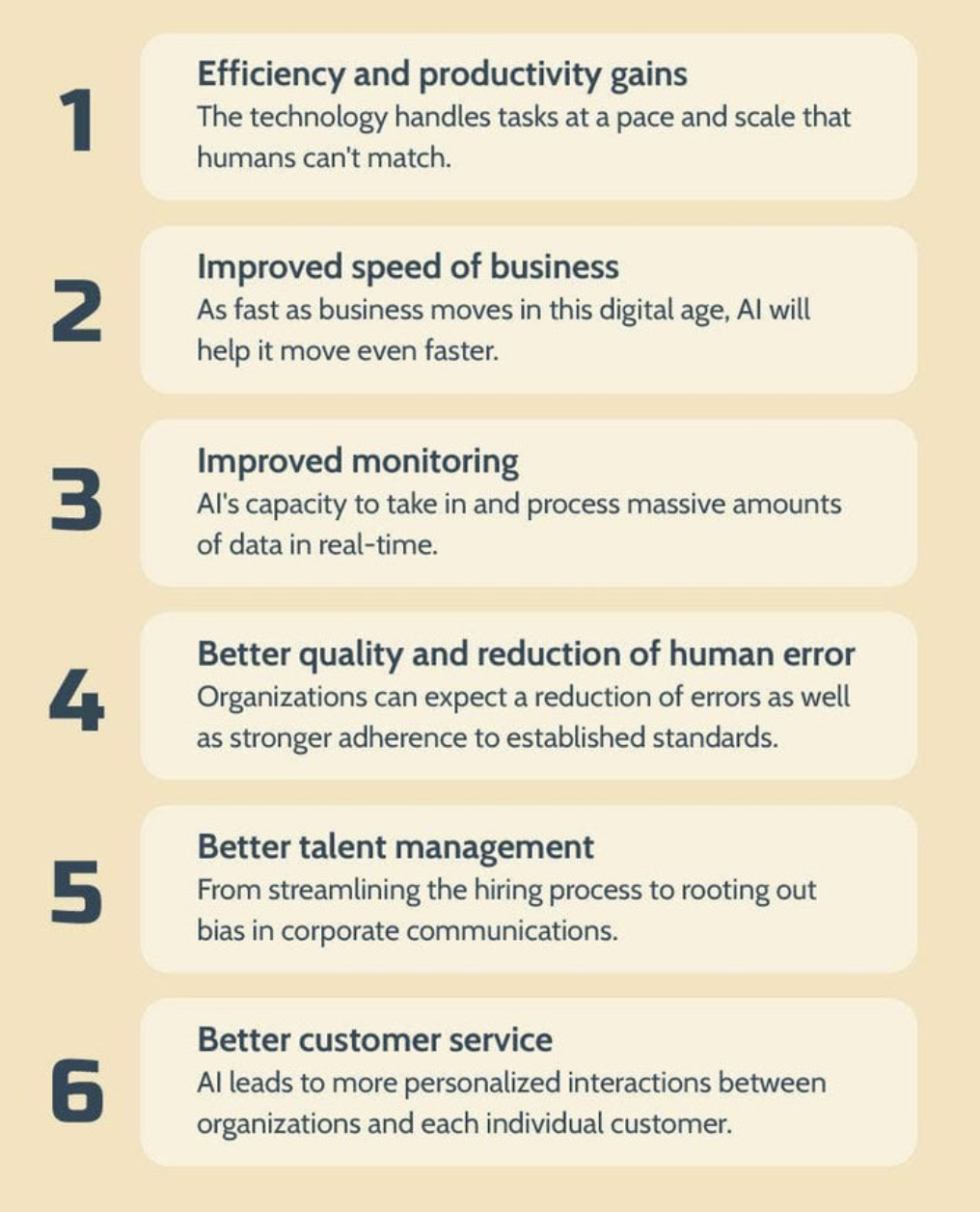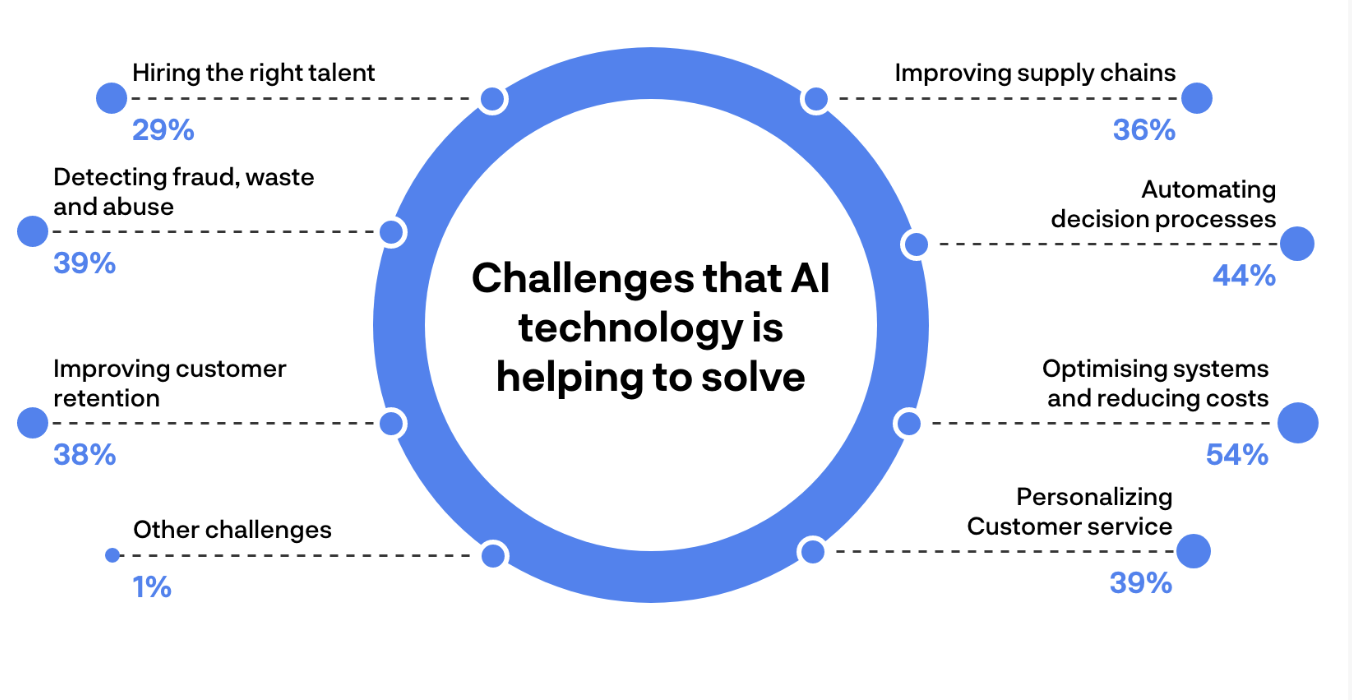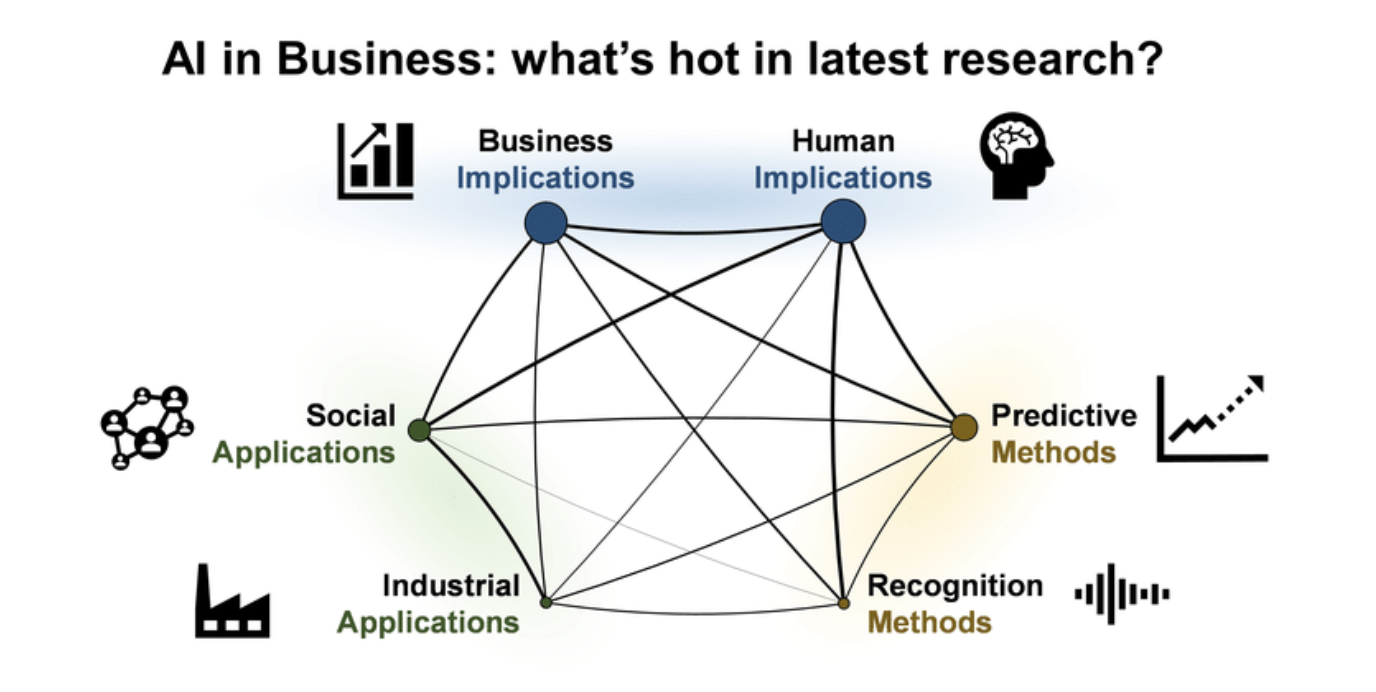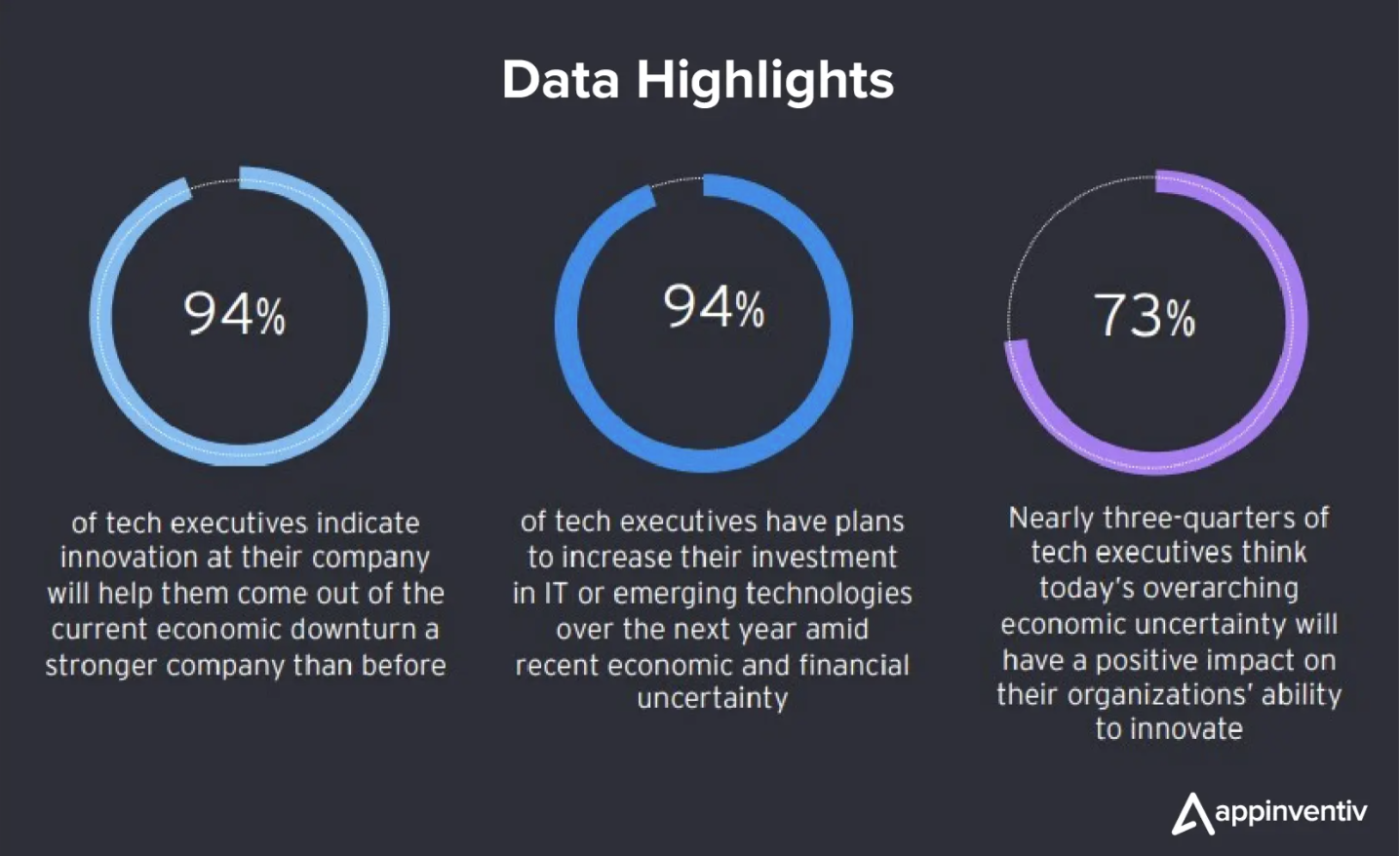
Blog / Disruptive Technologies
Enhancing Business Operations with AI: From Cybersecurity to Financial Management
Categories

In today's dynamic business landscape, fraught with evolving cyber threats, shifting customer behaviours, and increasingly complex data, it's no hyperbole to say that Artificial Intelligence (AI) has ushered in a new era.
You, as a business manager, are likely feeling the pace of change accelerating. And you might be seeking ways to navigate through uncharted digital territory. Stick around, because this blog post is geared specifically towards you.
We'll be discussing the pivotal role AI plays in everything from cybersecurity and digital marketing, to financial management and project management. That's not all, we'll also dive into its significance in change management and advanced data analysis.
Understanding the Power of AI in Business Operations
Whether you're a small enterprise or a large corporation, embracing AI can deliver a multitude of benefits. The beauty of AI technology is its ability to learn and adapt constantly, offering you the ability to optimise business operations, streamline processes, and improve productivity.
Think of AI as your business's silent partner, working behind the scenes to increase efficiency, reduce costs, and provide valuable insights. AI can automate mundane and repetitive tasks, freeing up your teams to focus on more critical, creative, and strategic aspects of your business. This not only accelerates your processes, but also reduces the risk of errors that can occur with manual tasks.
Moreover, AI provides an edge in decision-making processes. With its capacity to analyze vast amounts of data rapidly, AI can predict outcomes and trends with remarkable accuracy. This predictive prowess allows businesses to make decisions that are faster and more informed, providing a vital competitive advantage in the fast-paced world of business. Whether it's choosing the right marketing strategy, managing financial risks, or identifying opportunities for growth, AI brings clarity and precision to your decision-making processes.
Envision the three types of AI these ways: automating business processes, kind of akin to an efficiency expert; gaining insights through data analysis, behaving like a data scientist; and engaging with customers and employees, functioning as a reliable customer service representative. These roles can dramatically streamline operations, enhance customer experience, and empower employees in unique ways.
Narrowing it down, AI can serve as a game-changer in specific areas of your business too. For instance, in the sphere of digital marketing, AI can generate high-quality leads, predict customer behaviour, and personalise your marketing efforts, thus strengthening your customer relations and increasing revenue.
In the arena of financial management, AI shines in making accurate sales forecasts and risk assessments, handling asset management, and performing high-frequency trading, providing a panorama of endless possibilities for financial growth. Besides, in project management, AI can help synchronise complex tasks, manage resources, and forecast project outcomes, bringing about seamless running of projects.
Lastly, AI plays a pivotal role in change management by helping to formulate effective change strategies, providing insights on probable resistance areas, and facilitating smooth implementation of change, ensuring improved business transformation. So the fact remains indisputable: Embracing AI in business operations today isn't just a trend; it's a necessity.

AI: The Modern Catalyst for Business Transformation
In today's fast-paced business environment, Artificial Intelligence (AI) presents itself as a power player. This promising technology is not only a vital tool for large corporations but also a significant game-changer for small businesses. One key area where AI has truly revolutionised is customization. Say goodbye to the era of one-size-fits-all. Through AI, businesses can now deliver unique, tailored experiences that charm their customers and significantly increase engagement.
By leveraging AI's potential, businesses can automate regular processes, save valuable time, and optimise operations. This automation doesn't just lead to increased productivity but also aids in swift decision-making, reducing errors, and even predicting customer preferences. Imagine having an intelligent system that can churn out quality leads, ultimately enhancing your revenue, all while providing insightful analysis and advice to steer your business in the right direction. Exciting, isn't it?
Furthermore, AI's impact extends beyond the general business operations. It fuels industry-specific improvements ranging from targeted marketing to fraud detection. Industries are leveraging AI to enhance their research and development activities, opening doors to innovative product creations. For instance, in the pharmaceutical industry, AI assists in drug discovery, and in the retail industry, it enables efficient supply chain management and pricing optimization.
Artificial Intelligence and Machine Learning (ML) are not just influencing the software we use today; they are making them smarter, quicker, and more efficient. The future of business operations seems inextricably linked to AI. However, while the perks of AI automation are many, it's critical for you as a business manager to understand and manage the associated risks proactively.
All in all, embracing AI can significantly enhance your business landscape, leading to improved productivity, reduced costs, and increased profitability. No matter what type of business you're managing, AI is no longer an option to consider - it's an essential aspect of a successful business transformation strategy.
AI for Business: Relevant Facts you should know
AI-powered cybersecurity tools can predict and prevent breaches by learning from previous incidents.

Revamping Cybersecurity: AI's Role in Protecting Business Operations
Cybersecurity is arguably one of the most critical components of any business operation in this digital age. The increasing complexity of cyber threats coupled with a surge in online business activities has engendered an urgent need for advanced mechanisms to combat these threats. Here's where AI steps in. AI enhances cybersecurity by providing better threat detection, prevention, and response measures.
Among the key advantages of AI in cybersecurity is its ability to recognize patterns in extensive amounts of data. This feature allows AI systems to identify potential security threats that might bypass traditional security measures. AI doesn't just rely on static rules. Instead, it learns from the data inputs to observe patterns, flagging out anomalies that may signify possible cyberattacks.
Furthermore, AI has shown immense potential in bolstering infrastructure security. Powerful software solutions such as CrowdStrike, ThreatCloud AI, and Darktrace leverage AI capabilities to predict, detect, and effectively respond to cyber threats. For instance, Darktrace's AI-driven technology deploys machine learning and AI algorithms to detect and counter suspicious activities in real time.
However, it's crucial to emphasise that with the integration of AI systems comes vulnerability to cyberattacks. Businesses must therefore ensure their AI systems are well protected from potential threats. In fact, defending AI systems should be an integral part of the cybersecurity plan for businesses heavily investing in AI.
In essence, while businesses reap the benefits of AI, including automation and efficient data management, they must also appreciate the cybersecurity challenges that come with these advancements. AI, when appropriately secured and leveraged, can be an incredibly powerful tool in the cybersecurity arsenal, shielding businesses from the ever-evolving cyber threats.
Undeniably, the future of cybersecurity lies in AI. Harnessing AI's immense potential helps businesses mitigate risks, ensure secure transactions, and provide customer confidence, thereby strengthening their market position in today's highly competitive digital landscape.
Digital Marketing Revolution: The Impact of AI on Business
Artificial Intelligence (AI) is pushing the borders of innovation in digital marketing, transforming conventional strategies into highly personalised, engaging experiences. Its ability to analyse large volumes of data at lightning-fast speed enables businesses to deliver highly relevant, personalised content to their target audience.
A perfect example is AI's role in improving user experience. AI can tailor the interface based on user behaviour, customising the content and recommendations it offers, achieving an unmatched level of personalization. As a result, businesses can reach their target customers more efficiently, reducing costs, and increasing conversions.
Moreover, AI can generate quality leads by using sophisticated algorithms to predict customer behaviour, preferences, and purchasing patterns. This level of insight empowers businesses to tailor their marketing strategies in ways that resonate most with potential customers, resulting in increased revenue.
Not only does AI streamline marketing efforts, but it also eradicates errors that can stem from manual processes. Automation of digital marketing tasks not only saves time and effort, but it also optimises consistency, ensuring a seamless brand experience at every digital touchpoint.
Lastly, AI in digital marketing allows businesses to make faster, more informed decisions. Using advanced analytics, AI can provide real-time insights, enabling businesses to adapt their strategies quickly in reaction to changing market conditions or customer behaviour.
In conclusion, AI is revolutionising digital marketing, creating a more interactive, personalised, and efficient approach that’s driving business growth. Embracing AI in your marketing strategy isn't just an option anymore—it's essential for staying competitive in today's rapidly evolving digital landscape.
Financial Management Reimagined: The AI Advantage
If you're a business manager, you will know the importance of keeping a close watch on your financial operations. But what if you had a system that could do it with unmatched accuracy and efficiency? It's not science fiction—it's the application of Artificial Intelligence in financial management.
AI has become an essential tool in streamlining financial processes, providing benefits such as 24/7 access to accounts and personalised financial services. These benefits once seemed like a pipe dream, but now they’re a powerful reality reshaping the financial industry, offering unprecedented accuracy, reliability and convenience.
When AI is integrated into the financial sector, it enables businesses to go beyond just basic calculations. AI can offer predictive analysis, spotting trends and suggesting adjustments that can lead to improved profitability. For instance, TD Bank's AI system is used to manage customer relationships, providing improved customer satisfaction while reducing the burden on the bank’s staff.
But, perhaps the most significant benefit of AI in finance comes in the form of fraud prevention. By examining patterns in vast sets of data, AI systems can detect anomalous activity much quicker and with greater accuracy than any human could. This can protect businesses from serious losses resulting from fraudulent practices.
Embracing AI also encourages the initiation of algorithmic trading, a method that uses complex formulas combined with mathematical models to make quicker, more profitable trading decisions. Allowing AI to automate this aspect of financial management enables firms to minimise the latency that often hinders human traders, resulting in competitive advantages in the trading world.
In conclusion, it's clear that embracing AI in financial management can bring a host of benefits to businesses. The potential for increased efficiency, improved accuracy, and enhanced fraud prevention makes AI an investment that any savvy business manager simply can't afford to overlook.
Remember, AI isn't about replacing human effort—it's about augmenting human brilliance, making your team more efficient, more innovative, and, ultimately, more profitable in the financial market.
AI and Project Management: The Perfect Blend for Success
Today, with the help of Artificial Intelligence (AI), project management has transformed into a dynamic and highly efficient operation. AI not only supplements human intelligence but also augments the functionality and efficiency of your project management software.
Consider the time-consuming and mundane task of sorting emails and correspondences- AI can easily take that off your plate, giving you time to focus on more critical project objectives. AI-powered chatbots provide instant, around-the-clock customer support and virtual assistants can manage schedules and coordinate meetings more efficiently than ever before. AI-driven project management tools can also offer predictive insights, help in risk assessment, and streamline resource allocation. Quite evidently, adopting AI in project management can significantly enhance productivity and drive project success.
The Impact of AI in Scheduling Project Tasks
One area where AI shines in project management is automating task scheduling. AI algorithms can analyse historical project data, consider the complexities and interdependencies of the project tasks, and suggest an efficient scheduling plan. This can eliminate any bias from the process and ensure optimal resource allocation and task distribution based on real data.
Predictive Analytics: Anticipating Project Risks
AI can do more than just automate tasks. It offers project managers an edge by predicting potential risks and bottlenecks that could derail the project timelines. This is achieved by feeding past project data into AI systems, enabling them to detect patterns and anticipate roadblocks. This predictive intelligence allows project managers to take proactive measures to mitigate potential risks.
Improving Communication and Collaboration
A critical aspect of successful project management involves effective communication and collaboration among team members. AI can enhance this by processing and interpreting vast amounts of data from different communication channels and offering insights that aid in fostering teamwork and resolving conflicts, thereby maintaining harmonious relations within the team.
Conclusively, the potent combination of AI and project management frees up your time, contributes to strategic decision-making, reduces errors, and towards greater business outcomes. As a business manager, embracing AI could just be the strategic edge your operations need.
The Role of AI in Change Management: Driving Effective Business Transformations
Accelerating change is a common theme in today's business landscape. Whether it's a change in technology, business processes, or organisational structure, all require strategic orchestration to be effective. A critical ally in this journey is Artificial Intelligence (AI).
AI can provide a pivotal aid in change management by promoting agility, flexibility, and most importantly, innovation. You might wonder how AI does this. Let's delve deeper.
Recognizing the Need for Change
AI, with its predictive analytics potential, helps recognize the need for change quicker than traditional methods. By processing large volumes of data in real-time, AI can identify trends and patterns indicative of potential risks or opportunities. Consequently, you can anticipate changes before they become necessary, giving your business a proactive stance.
Managing Change Effectively
AI tools can automate routine tasks, enabling your workforce to focus more on implementing change rather than being bogged down by mundane activities. This allows for a smoother transition during periods of change. Moreover, AI can also assist in minimising resistance to change. It accomplishes this by providing insights into employees' sentiment, identifying those wary of change, and enabling proactive strategies to manage such situations.
Assessing the Impact of Change
Once a change has been implemented, the crucial task is to assess its impact. AI algorithms, through advanced data analysis, can evaluate whether the change has achieved its intended outcome, measure its relevance, and provide overall performance metrics. This ensures that the changes made are driving towards business transformation effectively.
It's essential to remember that the key to successful change management isn't just the implementation of AI, but the integration of AI with company culture, values, and structure. By embracing AI in your business operations, you open doors to new opportunities, innovation, and improvement. The future of business is AI-driven; don't let your business get left behind.

Advanced Data Analysis: The AI-Driven Approach
If you've ever felt overwhelmed by the sheer volume of data your business generates, AI-fueled data analysis could be the solution you've been searching for. Implementing AI into your data analytics strategy can provide key insights that are both detailed and data-intensive, which can help steer your business towards more informed decisions.
No longer do you have to comb through complex data sets or rely on rudimentary forecasts. AI, through advanced algorithms and machine learning, simplifies and enhances the data analysis process. It works by identifying patterns and connections that were not readily apparent. From these patterns, AI can predict future trends, open up new opportunities, and even alert you to potential pitfalls.
AI's ability to learn and adapt makes it a potent tool in your organisation. Unlike traditional methods, which tend to be static, AI evolves as your data changes. This adaptability ensures that your analyses remain accurate and relevant, even as market conditions fluctuate.
But it goes beyond just offering insights. AI delivers its findings in understandable, actionable ways. Oftentimes, the data you collect is raw and unstructured. AI transforms this into clear, digestible information that can be leveraged for developing actionable strategies and informed business decisions.
Whether you're looking to understand your customer's behaviour, optimise your operations or explore new market opportunities, the AI-driven approach to data analysis offers a compelling advantage. Embracing AI in your data methodologies is not just a smart move, but an essential one in an ever-evolving business landscape.
Case Studies: Success Stories of AI Implementation in Business Operations
Looking at real-world examples can often provide the most compelling evidence. Let's dive into some illuminating case studies that highlight the transformative influence of artificial intelligence (AI) in actual business operations.
Case Study 1: AI in Supply Chain Management - Zara
Challenge: Zara, a global leader in fast fashion, faced significant challenges in managing its supply chain, which is critical to maintaining its business model of rapid design, manufacture, and distribution. The primary challenge was to reduce lead times and manage inventory more efficiently across its vast retail network to meet rapidly changing consumer demands.
Solution: Zara implemented artificial intelligence systems to streamline its supply chain operations from production to distribution. AI algorithms were used to analyse real-time sales data and customer preferences, which enabled predictive analytics to forecast future demand trends accurately. These insights allowed Zara to optimise its stock levels and production schedules, reducing waste and ensuring stores received exactly what consumers desired. The AI integration not only improved operational efficiencies but also contributed to a more responsive supply chain that could adapt quickly to new fashion trends.
Case Study 2: AI-driven Customer Service Enhancement - Bank of America
Challenge: Bank of America, one of the largest banks in the United States, sought to enhance its customer service operations to handle a high volume of daily customer inquiries efficiently. The challenge was to provide immediate, 24/7 customer service that could handle complex queries without escalating them to human agents.
Solution: The bank introduced Erica, an AI-powered virtual assistant, to its customers. Erica is capable of handling a range of functions, from providing users with credit report updates to helping them initiate money transfers. By leveraging natural language processing and machine learning, Erica can understand and process customer requests and learn from interactions to provide better responses over time. This AI implementation has drastically reduced the load on human customer service representatives and improved customer satisfaction through its timely and accurate assistance.

Learn to manage AI for Business with our Digital Transformation Master
In our Digital Transformation Master we teach you how to apply Artificial Intelligence (AI) comprehensively across all aspects of your business. This programme is designed to transform your understanding of AI from a theoretical concept into a powerful business tool that you can leverage to enhance every facet of your organisation.



